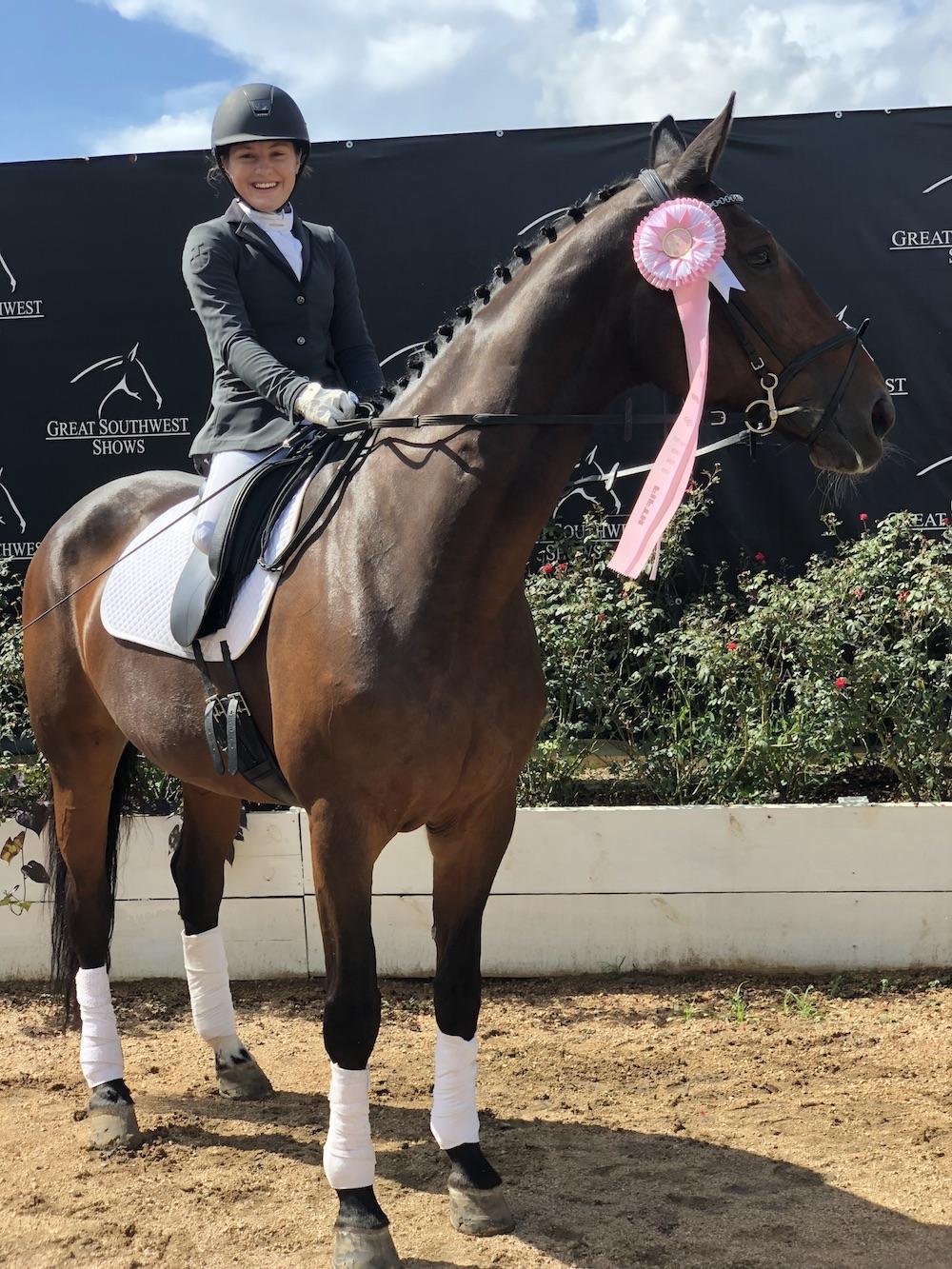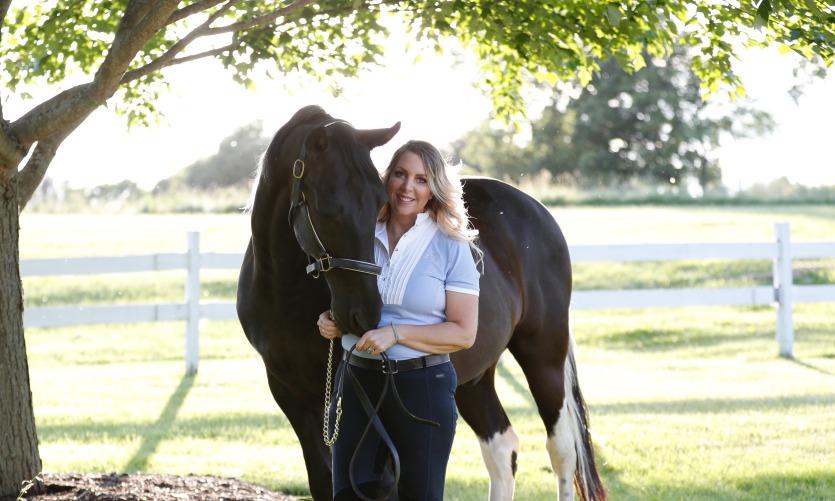
‘It’s Always a Journey With Horses’: Q&A With Para-Dressage Equestrian Alyssa Cleland
Julie Saillant of Motivation Addict catches up with Grade V Para-Dressage rider Alyssa Cleland to talk about goals, positivity, and of course, horses.
I had the pleasure of interviewing Alyssa Cleland, a Grade V para Dressage equestrian who lives and trains in Texas. To say that Alyssa has overcome some difficult life circumstances would be a huge understatement. She was born in the Ukraine with a rare condition called Paraxial Tibial Hemimelia, which left her without a tibia in her right leg, and resulted in a partial loss of the limb. She was adopted at age four and brought to the U.S.; by the time she was ten she had caught the horse bug and started riding horses. Today, Alyssa is a serious athlete who is on track to go to the 2024 Paralympics in Los Angeles.
Julie Saillant: Welcome Alyssa! Thank you for being here today.
Alyssa Cleland: Thank you for having me! I can’t wait to answer your questions and talk with you about horses.
JS: What made you decide to start this journey?
AC: I had just quit the US Women’s Paralympic Sitting Volleyball Team and was working at a show barn in Kansas and was ready for a change! Someone mentioned para-dressage to me and said I should investigate it. I called the Director of USPEA and told her I wanted to get involved. I moved back to Oklahoma and started traveling to Texas to train with para-dressage coach, Kai Handt and have been doing so ever since.
JS: What obstacles have you encountered?
AC: There are a few things:
1. How hard it was going to be to ride without my leg. I understand that you can ride with your prosthetic, however I chose not to and it’s a learning curve. I thought I was really coming along in my riding, and I started training with Kai and was brought down to level 1 quickly.
2. The financial stress. As a young adult, I haven’t finished college and work an entry level job. Horseback riding is a money sport and either you have it, or you don’t. I’ve been fortunate that my trainer lets me make monthly payments, but I’ve had to cut back on training because I can’t afford it.
3. Not having enough time. I work full time and I’m trying to go back to school, so finding time to ride has been something that I’ve had to play with to get a routine down.
JS: How did you find your horse? Or did she find you?
AC: Daytona found me… I think. I was leasing another horse named Cappi and after the lease, I was told to ride Daytona for the time being. Six months later and we’re still together. Daytona was owned by a Grade I para-dressage rider who took her to Rio for the Paralympics!
JS: What does your training schedule look like?
AC: I train two days a week, but I’m there most days. Fridays are spent schooling to keep her in shape and make sure we’re not losing ground.
JS: Daytona stands rock still and waits patiently while you mount up, which is so important.
AC: Yes! It takes me a little bit to catch my balance. She stands there and looks at me like “Are you on yet? Because I’m ready to go!” I have her in the cross-ties and then I have to move away to take my leg off, and she stands and waits until I’m ready. It’s really nice and it’s something that obviously not every horse will do, which is a struggle as I try to find a new horse.
JS: Are you looking for a new horse?
AC: It’s touch and go. A lot of things have to fall into place before I find my next partner.
JS: What are your goals?
AC: Paralympics! I think realistically the 2024 Paralympics are more doable at this point. I would also like to go to the next World Equestrian Games and start competing this year. The first and most important goal is to get sponsorship, find a horse that can take me where I need to go, and just train my little caboose off.
JS: Can you tell us what horses have taught you?
AC: Starting with Cappi, she taught me how to land on my feet which is a great skill to have! Daytona has taught me about patience, she has very little patience for anything. When we are learning new moves, it doesn’t happen overnight and she might not get it the first time which can frustrate me, but they are a living, breathing creature and you need to respect their boundaries. These things take time and you gotta wait for them to figure it out and once they do, then you can move onto the next thing. It’s taught me that I have to let her take the time she needs to figure it out and learn what she needs to learn to be comfortable.
JS: I understand the feeling of being different. How have you taken that energy and turned it into a positive force in your life?
AC: I personally don’t think of myself as different than anybody else. I just try to live my life and be the best version of me I can be. I’m used to being stared at, catching people saying things under their breath, bullying and all kinds of stuff. Because I’ve been through that, I try to treat everyone with the same kindness that I want in return, and it seems to do the trick. My positivity stems from me just wanting to enjoy life to the fullest. I love the saying,” I’m here for a good time, not a long time!” I say this phrase daily!
JS: What advice would you give someone who has had an accident or injury and is having a hard time adjusting to their new normal?
AC: I’d say just take it slow. Everything with horses is one day at a time, and eventually it’s going to get to the point where you’re going to be OK and slowly regain your confidence. Your horse has to figure out what your new normal is and you gotta give them that time to adjust. You’ve got to give them that kind of trust.
The person who previously rode Daytona had all her limbs, but she was wheelchair bound. I was only one out of a handful that have ridden her who are missing a limb. It’s a stretch for her – she’s asking: “What’s wrong with this person?” or “Why are they giving me different cues?” We can do a better canter cue without my leg than with my leg! You gotta trust your horse that they are going to be able to do their job.
I think the most important thing is to get your confidence back in and out of the saddle. Just spend time with your horse to get them used to the new you. I know that Daytona knows there’s something wrong with me, physically. When I go to mount her, I don’t have my leg on, so I hop onto the mounting block, and she turns her head to see if I’m ok and if I can get on without hurting myself. Trust your horse and in the relationship you have with them. Your horse is a lot smarter than you’ll ever know.
JS: Horses are so forgiving. Have you experienced forgiveness from Daytona?
AC: Yes! Especially when we were first starting on our own trying to get all the cues down. We had a lot of problems cantering because I just can’t hold onto the reins. I held on super tight and she did NOT appreciate that at all, and it was a lot of trial and error.
She’s been super forgiving of me with everything we’ve been trying to learn and every new thing our trainer introduces. There is nothing to forgive her for because she’s a perfect unicorn and she’s always trying – I reward her for every try.
JS: You said you wouldn’t change anything and that everything happens for a reason. Many people look at the past and their life with regret. Why did you say that?
AC: I grew up without the leg, I was born without it. I wouldn’t have gotten all these crazy opportunities if I had both legs. I wouldn’t have been playing volleyball, which then leads me to working at a show barn in Kansas, to then getting in touch with the Director for para equestrians, then going to Texas to train, which ultimately leads me to gain more momentum towards my goals.
Sometimes it can feel like you’re in a terrible place and that all these bad things are happening, but eventually you will look back and think – This had to happen because I had to grow, or I had to learn something to be better. It’s always a journey with these horses, it’s not one ride.
JS: What would you say to equestrians who are not accepting of either themselves or where they are right now?
The best advice I could give is to just keep at it. I know it’s hard, but you’re not doing yourself any favors by giving up. When I started working with Kai, I wasn’t as good as I thought I was. Now almost a year later, I’m 1000% better than when I started, but I still have a long road ahead of me, and that’s ok! You’re going to have good lessons and terrible lessons. You’re going to have your “ah-ha” moments and your “I can’t believe I did that” moments! It’s all part of the journey. And someday, you’re going to look back and see that everything brought you to where you are now.
JS: What, if anything, would you have done differently?
AC: I would do nothing differently! I think everything happened when it was supposed to happen, and even though I didn’t enjoy some things, they needed to happen to help develop me as a person and a rider.
JS: It meant the world to me to speak with Alyssa and this is why: Alyssa is a unique combination of a joyful person with a deep-rooted determination about her goals, which is not typical. She let’s nothing stand in her way of being not only a successful person, but a happy one. We can all learn from her never-quit attitude and the grace that she brings to the sport. Success comes in many different forms. It reminds me that only when you embrace what’s different about you and make it an asset instead of a limitation, will you hold true happiness in your hands.
Julie Saillant is a Certified Life Coach, Empath, Equine Communicator and Lifestyle Influencer. Her goal is to empower you to awaken your intuition and motivate you to take inspired action to live your best life. She is the bridge between horses and people and is here to give you the knowledge and tools to interact with your horse on a deeper level. Using her empathic intuition, Julie will guide you towards a stronger understanding of what you want your life to look like, while giving you the means to manifest your biggest dreams and make them a reality. Learn more at www.motivation-addict.com.













Leave a Comment